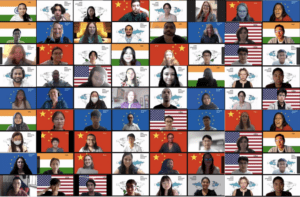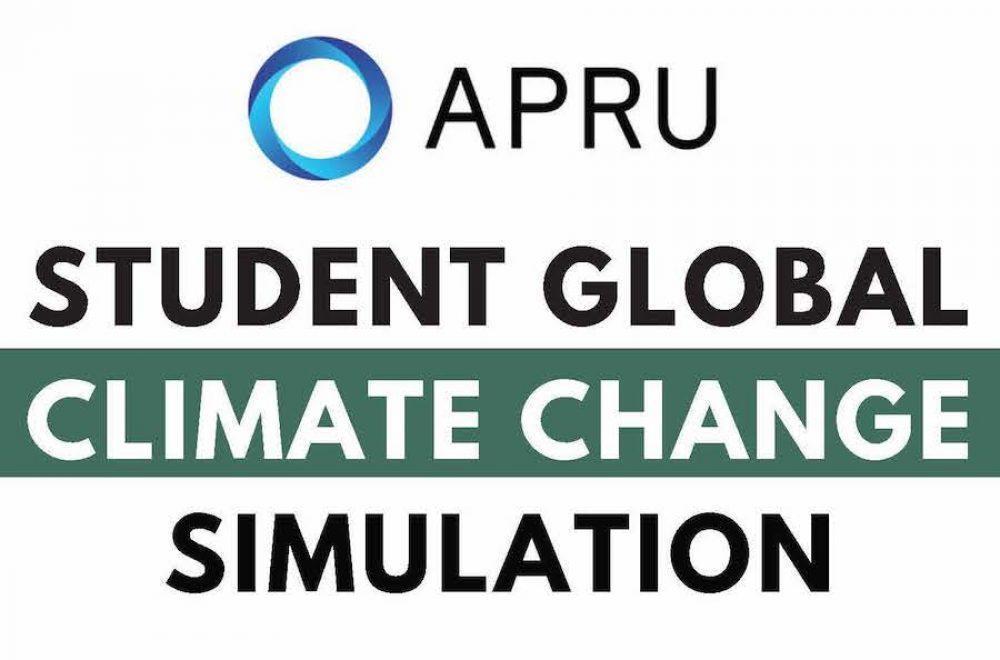In time for the upcoming COP26 meetings, 120 dedicated APRU students from across the Asia Pacific region and close on 40 expert speakers and facilitators from within and outside the APRU network contributed to and concluded the first APRU Climate Change Simulation.
The 3-session is a role-playing exercise in which students formed multi-country, multi-disciplinary teams to slip intothe roles of delegates to the UN Climate Change Negotiations.
The APRU Student Global Climate Change Simulation uses materials from Climate Interactive and the EN-ROADS simulation model developed by MIT. Live sessions and breakout room-discussions were supplemented with keynote presentations by experts from the IMF, adidas, and the World Business Council for Sustainable Development, short lectures from key experts across the network and other materials developed and curated by the APRU expert team. On the long list of intriguing topics were indigenous knowledge, planetary health, public health, coastal habitats, deforestation, clean energy, trading and offsets, as well as diplomacy and negotiation skills.
APRU envisions the event to be the first of many activities to develop a network of committed citizens who tackle climate change head-on.
“The opportunity to work across different disciplines, places and perspectives as part of this negotiation simulation wasa rare chance for students to learn about the complexities of developing solutions to urgent global challenges, the largest of which is climate change,” said Kathryn Bowen, Deputy Director of Melbourne Climate Future, University of Melbourne.
Kristie Ebi, Professor at the Center for Health and the Global Environment, University of Washington, also one of the sixteen participating APRU experts actively facilitating the negotiations and discussions, added that “the APRU Student Global Climate Change Simulation represented a call to taking collective action against global warming.”
The APRU Student Global Climate Change Simulation was co-organized by the APRU Sustainable Cities and Landscapes Program housed at the University of Oregon and the APRU Global Health Program housed at the University of Southern California. External partners include Adidas, Rebalance Earth, Smart Energy Connect-CLP, Tuvalu Mo Te Atua, UN Habitat and the World Business Council for Sustainable Development.
The participating students gave their thumbs up. For instance, Annette Benger, who studies Masters of Environment at Melbourne University, shared that the event has taken her understanding to the next level.
“In my lectures on Sustainability and Behaviour Change, we are discussing the role of selfishness and altruism in human nature,” Benger said.
“It is so easy to see so much selfishness, until you come across something like this, and we are all planning to keep in touch in our WhatsApp group,” she added.

The APRU Student Global Climate Change Simulation also impressed its facilitators, with Tze Kwan, Research Associate, Centre for Nature-based Climate Solutions, National University of Singapore, labelling the event “super”successful.
“I am honoured to be part of this and to have had the opportunity to share my interests with the participants,” Kwan said.
“This event was such a valuable learning opportunity, making me hope more students will get to attend and be inspired to act in face of climate change,” she added.
The APRU Partner Universities involved in the Student Global Climate Change Simulation are Monash University, Nanyang Technological University, Peking University, Tecnológico de Monterrey, The Chinese University of Hong Kong, The Hong Kong University of Science and Technology, The University of Auckland, The University of Melbourne, Tohoku University, Universidad San Francisco De Quito, Universiti Malaya, and University of Washington.
Find out a featured article from University of Southern California, here.
Find out a post-activity report from University of Oregon here.
Read students’ feedback from a CUHK article here.

